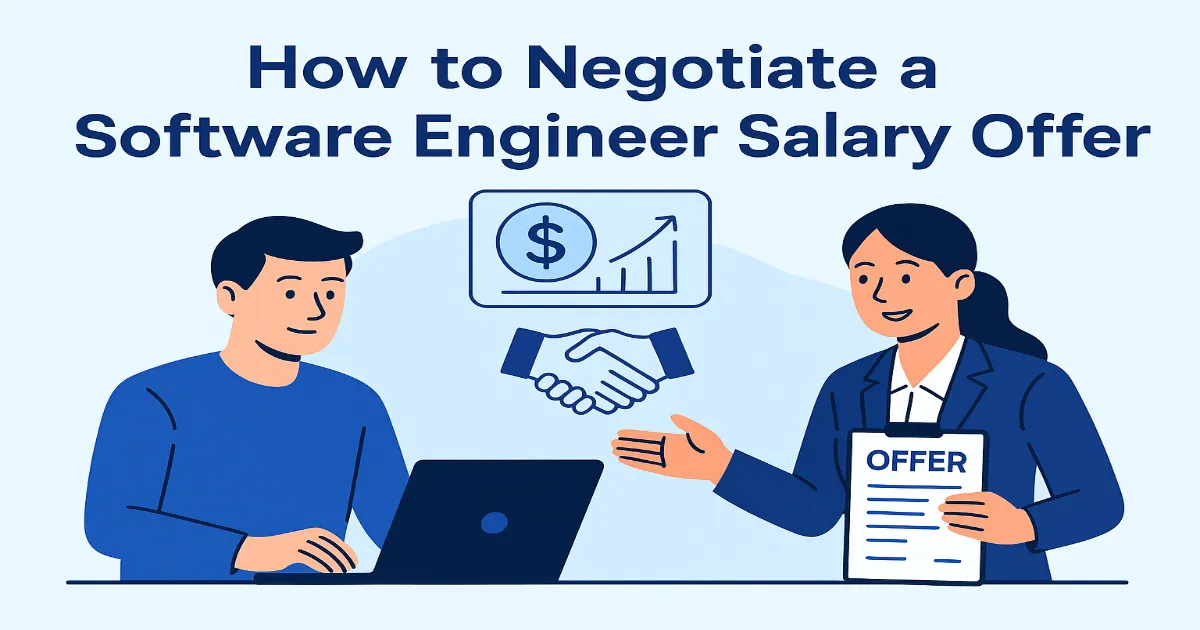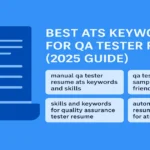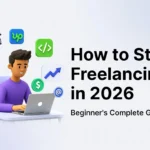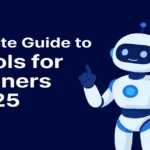Negotiating your software engineer salary is a critical step to ensure you’re fairly compensated. In 2025’s competitive tech market, preparation and strategy are key. Start by researching your market value: use sites like Glassdoor, Levels. Fyi, or salary surveys to find benchmark figures for your role, level, and location. For example, regional guides note that a software engineer in Sydney earns about 8% above the Australian average, whereas in Melbourne or Brisbane it’s only ~2% above average. Understanding these local salary bands and industry standards helps you set realistic targets and avoid leaving money on the table.
Next, understand the full offer package. A typical software engineer offer includes base salary, performance bonus, equity (RSUs or options), a potential signing bonus, and other perks. Know the value of each piece. Salary experts emphasise that “understanding your total compensation is the first, and arguably most important, step”. For example, Google offers a base salary plus yearly bonus and equity grant, and while the bonus amount is set by level, negotiating a higher base also boosts that bonus. If you’re unsure about any part of the offer (like how equity vests or what bonus percentage is typical), ask questions early to clarify. These strategic questions not only inform you but also signal your engagement. For instance, one recommended question is “What is the expected annual equity refresher for this role?” which helps frame your counteroffer.
- Review market data. Use salary guides (like Robert Half’s or industry sites) to gauge pay by level and region.
- Evaluate your value. List your skills, accomplishments, certifications, and seniority. Highlight any specialised experience to strengthen your case.
- Prepare evidence. Gather quantifiable results (e.g. “I led a feature that increased revenue by X%”) to justify why you deserve top-of-range pay.
- Check company norms. If possible, learn the company’s compensation philosophy or pay bands (e.g., via past employees or recruiter hints) so you know how much flexibility exists.
Timing and Strategy
Do not reveal salary expectations too early. Whether you’re interviewing or discussing with HR, avoid stating your desired number until after an offer. Recruiters often ask for your expectations as a shortcut, but experts warn this can backfire. As one guide notes, Google’s recruiters are trained to fill offers without negotiation, so never give them a figure before you have an official offer. Instead, respectfully deflect: say you’d like to learn more about the role and ask what range the position has.
For example,
TeamRora suggests responding with something like “I’m not sure I know enough about the role or company to determine that yet, but is there a range budgeted for this position?”. In many places (e.g. California), companies must disclose the pay range if you request it.Wait for the formal offer to negotiate. Your leverage is strongest after you have an offer in hand. The Salary Negotiator advises to “avoid starting the salary negotiation until you have an offer… because this gives you more leverage”. Recruiters expect you to negotiate only once the offer is concrete. Once you receive an offer, thank the company and ask for a short time to review it. Taking even a day can be helpful. TeamRora recommends, for instance, taking “a few hours (or a day!) away from the offer before starting to analyse it, since emotions can run high”. Use that time to compare the offer to your research and decide exactly what you want to request.
Crafting Your Counteroffer
When you’re ready to negotiate, do so professionally and calmly. Whether you choose email or phone, frame your request with enthusiasm and facts. Always start by reiterating your gratitude and excitement for the role. Then explain why you believe a higher compensation is justified, backing it with data. For example, Indeed’s negotiation guide advises: “Begin by expressing your enthusiasm for the job opportunity, followed by your salary expectations. Substantiate your claim with the evidence you’ve prepared”. Keep the tone polite and assertive, not demanding. Emphasise your fit and what you bring to the team.
Most coaches recommend sending a counteroffer via email first. This gives you time to choose your words and provides a record of your request. The Salary Negotiator suggests writing a concise, courteous email that references your market research. You might write: “Thank you for the offer! I’ve reviewed the details and I’m very excited about the opportunity. Based on my market research and experience, a total compensation closer to $X would better reflect my skills and the role’s requirements. Would you be able to adjust the offer accordingly?” TeamRora provides a template: “Thank you again for sending over all of the offer details. I took some time to review everything, and based on my [key skill/experience] and the offer I have from [OtherCompany], if [YourCompany] could get the compensation to [desired amount], I’d be happy to sign with [YourCompany] today.”. Ending with a readiness to sign (if your terms are met) puts positive pressure on the employer.
Negotiate multiple components. Do not focus only on base salary. In tech offers, equity and bonuses are often negotiable. As TeamRora notes, “the most negotiable component between base, equity, and signing bonus is the equity grant”, since companies would rather grant more stock (which costs them less cash) than raise base pay indefinitely. If the base salary is fixed, you can ask for more stock units, a higher annual bonus target, or a signing bonus. For example, even Google rarely includes a signing bonus by default, so “you will often have to negotiate for a Google joining bonus”. Similarly, you can negotiate extra vacation days, flexible hours, or work-from-home days as part of the package. TeamRora suggests an “excitement sandwich” approach when addressing multiple items: “Start the conversation by reiterating your interest in the job and company, then acknowledge your reservations (e.g. low PTO or missing bonus), and finally share your excitement and intent to sign if they can meet your requested terms.”. For example: “I’m very excited about this role, but the PTO offered is much lower than I currently receive. I will also be missing out on my annual bonus at my current job. So, if [Company] could add a signing bonus of $X and two additional weeks of vacation, I’d be excited to sign immediately.”.
Handle objections gracefully. If the recruiter pushes back, stay calm and open. The Salary Negotiator advises saying something like, “I understand that’s the budget, but could you please take my request back to the team for one more review?”. Emphasise that your goal is mutual: you want to join the company on terms that reflect your worth. Remember, respectful negotiation rarely costs you the job. Experts say Google has never rescinded an offer simply because someone negotiated. You can safely advocate for yourself; a well-prepared, courteous request is usually met with consideration, not offence.
Practice and presentation. Rehearse what you will say or write. Many sources highlight the value of practising negotiation “scripts” or role-playing scenarios. Robert Half’s advice is to “leverage scripts or templates… outlining your skills, experience, and market trends to justify your desired salary”. Practicing helps you stay composed and articulate under pressure. In the actual conversation (phone or Zoom), maintain confident body language: sit upright, smile, and listen actively. Keep your tone positive and collaborative. Let the employer do most of the talking after you present your case. One tip is to pause after stating your request and let them respond; don’t rush to fill the silence or justify further. This shows confidence and makes them engage with your proposal.
Common Mistakes to Avoid
Several pitfalls can undermine your negotiation:
- Revealing your expectations too soon. As discussed, don’t name a number first or give your current salary. If asked, deflect and say you’d prefer to hear the range first.
- Accepting the first offer. Recruiters expect negotiation, so treating the initial offer as final leaves money on the table. Don’t feel rushed to say yes immediately.
- Not researching enough. Failing to gather market data or understand local pay trends will weaken your position. Always have a salary range backed by reliable sources.
- Using ultimatums or sounding desperate. Never issue demands or threats like “take it or leave it.” Indeed warns against ultimatums, emotional appeals or comparing yourself to coworkers in your negotiation email. Instead, stay positive and keep the discussion professional.
- Focusing only on base salary. If you only ask for a higher base and ignore bonuses or equity, you may miss out on valuable compensation. Make sure to discuss every part of the offer that matters to you.
- Letting anxiety control you. Many tech workers find salary talk intimidating, but remember that negotiation is expected for software engineers. Expert advice is to “be realistic” and informed. Know your worth, but also know where you have room to improve if an employer can’t meet your ideal request.
Staying prepared and professional will help you avoid these mistakes.
Negotiating in Different Regions (Tier 1 Countries)
Negotiation norms can vary slightly by country, but in Tier-1 tech markets (US, Canada, UK, Australia, etc.), it’s broadly expected that candidates will negotiate. For example, British and Australian recruiters emphasise the same fundamentals: do market research, practice your pitch, and justify your ask with your skills. A UK tech recruiter advises using salary sites to benchmark what you “should be paid based on your skills and location”. Robert Half’s Australian guide notes regional differences (e.g. cost of living) and recommends that candidates “negotiate from an informed position,” acknowledging local market trends. In the US and Canada, pay bands tend to be higher, and recruiters assume you’ll ask. Always tailor your approach to local customs: remain polite and formal in English-speaking countries, and never cite cultural “myths” like the idea that you shouldn’t negotiate at all (even at elite companies, negotiation is routine). On LinkedIn and forums, engineers worldwide share that negotiating brought tens of thousands of dollars in extra comp, so the practice is common.
Sample Negotiation Email and Phone Script
Sample Counteroffer Email: As soon as you decide to negotiate (after receiving the official offer), send a brief email. A simple template might be:
Subject: [Job Title] Offer Discussion
Dear [Recruiter Name],
Thank you for extending the offer for the [Position] at [Company]. I’m excited about the opportunity. After carefully reviewing the details and doing market research, I feel that a total compensation of $X (base $Y + bonus $Z, etc.) would better reflect the value and responsibilities of this role given my experience. For reference, I have [x years] of experience in [relevant skill] and have achieved [brief achievement]. I understand budget constraints, but if [Company] could adjust the offer to this range, I would be very enthusiastic to accept and start contributing to the team. Thank you again for your consideration.
Best regards,
[Your Name]This format starts with gratitude, cites your research/qualifications, and makes a clear request.
TeamRora offers a similar example: “Thank you again for sending over all of the offer details. I took some time to review everything, and based on my [unique skill] and the offer I have from [OtherCompany], if [Company] were able to get the compensation to [desired amount], I’d be happy to sign [today].”. Notice the emphasis on excitement and readiness to sign, which keeps the tone collaborative.
Sample Phone Script (“Excitement Sandwich”): If you move to a call (which can be more effective than extended email exchanges), use an “enthusiasm sandwich.” For example:
“First, I want to say how excited I am about the team and this role. It seems like a great fit for my background in [skill/domain]. After reviewing the offer, I did have a concern: the proposed PTO is lower than what I currently have, and I will be foregoing a sizable bonus at my current job by making this move. If [Company] could offer a signing bonus of $X and an extra two weeks of vacation, I would be thrilled to sign the offer right away. I want to join your team and hope we can find a solution.”This script begins and ends with enthusiasm, but sandwiches your requests (in this case, extra PTO and a sign-on bonus) in between. According to negotiation experts, this approach shows you are keen to join while clearly stating what you need to accept. After delivering your key points, pause and listen. Let the recruiter or hiring manager respond, then clarify as needed.
Throughout the call, maintain a friendly tone. If you get pushback, you might say: “I understand this might be above budget. Could you take it back to the team one more time?” This keeps the door open without confrontation. Remember to thank them at the end and follow up in writing any agreed changes.
Key Takeaways and Best Practices
- Prepare thoroughly. Research salaries, know your priorities (what parts of comp matter most to you), and have evidence of your value ready.
- Be professional. Write and speak politely, using a collaborative tone. As one recruiter notes, maintain a “high level of enthusiasm” and confidence without being abrasive.
- Negotiate everything. Think beyond base pay: ask about bonus structures, equity refreshers, PTO, remote work, visa support, etc. The company wants you on the team and often has flexibility in non-cash perks.
- Practice your negotiation. Use templates and role-play. Many successful negotiators rehearse scenarios and even write out their “script” to stay calm and persuasive.
- Avoid mistakes. Don’t give numbers first, don’t accept too quickly, and don’t issue ultimatums. Research and rational justification are far more effective than emotion.
- Use leverage appropriately. If you have multiple offers, mention them honestly to strengthen your case. If not, focus on your demonstrated value and how hard it would be for the company to find someone like you.
- Stay flexible. While you should aim high (experts often suggest asking ~25% above your target), be ready to compromise on less critical points. A negotiation “win” is often defined as landing around 80% of your requests.
In summary, negotiating a software engineer salary offer is about balancing confidence with courtesy, and data with tact. By researching deeply, communicating clearly, and being prepared with examples and questions, you maximise your chance of a higher offer. Remember that negotiation is expected at all levels (even entry-level roles at Google or FAANG). Approach the conversation as a friendly dialogue: show your excitement, justify your requests with market facts and achievements, and you’ll often find the company is willing to meet you partway (or sometimes fully). A successful negotiation doesn’t just boost your pay — it also sets a positive tone for your relationship with your future employer.
FAQ 1: How do I start the conversation to negotiate a software engineer salary offer?
Answer:
Start by expressing appreciation for the job offer and enthusiasm for the role. Then, politely present your case with supporting data. Use salary benchmarks and explain why you believe a higher compensation is justified. This approach is one of the best software engineer salary negotiation tips 2025 and ensures a positive tone throughout the conversation.
FAQ 2: What are the most common software engineer salary negotiation mistakes to avoid?
Answer:
Common mistakes include revealing your salary expectations too early, accepting the first offer without thoroughly reviewing it, focusing solely on the base salary, and using ultimatums. Being well-informed and professional is key to avoiding software engineer salary negotiation mistakes that could cost you thousands over time.
FAQ 3: Should I negotiate my software engineer salary offer, even if it’s already a good one?
Answer:
Yes, negotiating is still recommended. Employers typically leave room for negotiation, even in strong initial offers. By asking the right software engineer salary negotiation questions, you may uncover flexibility in bonuses, equity, or other benefits, especially in high-paying markets like FAANG or Tier 1 countries.
FAQ 4: How can I prepare for a software engineer salary negotiation with multiple offers?
Answer:
When you have multiple offers, compare the full compensation packages, including base, equity, bonus, and perks. Use one offer as leverage professionally and respectfully. This strategy is essential in software engineering salary negotiation with multiple offers to maximise your total rewards.
FAQ 5: Are there email templates for software engineer counteroffer responses?
Answer:
Yes, using a software engineer salary negotiation email template can help you communicate clearly and professionally. Templates typically include a thank-you, your compensation request based on market data, and a collaborative tone. This is one of the most effective software engineer counteroffer tips in 2025.












